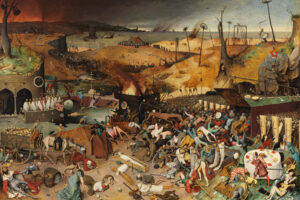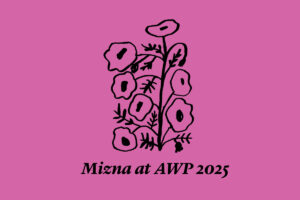
December 20, 2024
Moheb Soliman Rejoins Mizna Staff as Executive Editor and Literary Programs Director
Mizna welcomes Moheb Soliman, who will begin as Executive Editor and Literary Programs, taking over from George Abraham’s distinguished period at the helm of the Mizna journal. Abraham will continue on in a new role as Editor at Large and Editor of Mizna Online, as they settle into their new faculty position as Writer-in-Residence at Amherst College’s English Department. “Over the past year, Mizna has played the critical role of providing space for our communities to gather in collective grief, rage, and solidarity. This staffing expansion comes as Mizna continues to meet an urgent moment for our communities in and from Palestine, Syria, Lebanon, Sudan and beyond; publishing, screening, promoting, and preserving Arab & SWANA voices through new and existing programs,” says Mizna’s Deputy Director Ellina Kevorkian.

Soliman first joined the staff of Mizna more than ten years ago as a transplant from Montreal, moving to Minnesota, where Mizna is rooted, to work as Community Liaison and eventually becoming Program Director, working closely with director Lana Salah Barkawi. For five years, he became familiar with local and national contemporary Arab/SWANA creative spheres, and led Mizna into new interdisciplinary art and literary territories. During this time, Soliman developed his own practice as a poet and performance artist, creating work at the intersection of identity, modernity, nature, and otherness. “I am thrilled to be back with the organization, colleagues, and community that so deeply shaped me. I can’t wait to continue the work of amplifying and expanding the boundaries of our creative expression and critical consciousness,” says Soliman.
In 2018, Soliman left Minneapolis for the multi-year Tulsa Artist Fellowship and eventually returned for a BIPOC-centric fellowship with Milkweed Editions. There, he focused on development and acquisition for the Seedbank series, which holds books from across the globe and across time that deal with human relationships to environment, place, and the non-human living world. He was also part of the Milkweed editorial team, guiding diverse poetry, fiction, and creative non-fiction manuscripts through the publication process to books. Both of these recent immersions, in addition to years of project management and programming work with an array of Twin Cities arts organizations and national literary institutions, make his return to Mizna in this new capacity a fitting, exciting, and happy one.
Moheb Soliman attended Eugene Lang at the New School for Social Research and the Ontario Institute of Studies in Education at the University of Toronto. His debut poetry book HOMES was published by Coffee House Press. He lives in Northeast Minneapolis with his partner, writer Kathryn Savage.

George Abraham is a Palestinian American poet, essayist, critic, and performance artist. They are the author of When the Arab Apocalypse Comes to America (Haymarket, 2026) and Birthright (Button Poetry, 2020), which won the Arab American Book Award and was a Lambda Literary Award finalist. As Executive Editor of Mizna, Abraham has spearheaded the production process of three print journals, Myth and Memory, Cinema, and Catastrophe, and has helped launch and edit our new digital publication, Mizna Online. On their new position, Abraham commented, “I am excited to continue visioning and producing an online publication which complements our biannual print publication with regular content reflecting on the urgent and current realities of the SWANA region and beyond. In a moment where so many authors and artists are being censored for expressing their solidarity with Palestine, Mizna Online has become a vital space. As we continue to stand against the genocide in Gaza, we have focused much of our efforts this past year on publishing work in solidarity with Palestine. Forthcoming work will continue to critically engage with Palestine and Sudan as well as recent developments in Syria and beyond. We also look forward to expanding our work in literary and cultural criticism, with projects such as Hazem Fahmy’s Uncrafted column, and other urgent projects addressing gaps in the literary landscape.”












